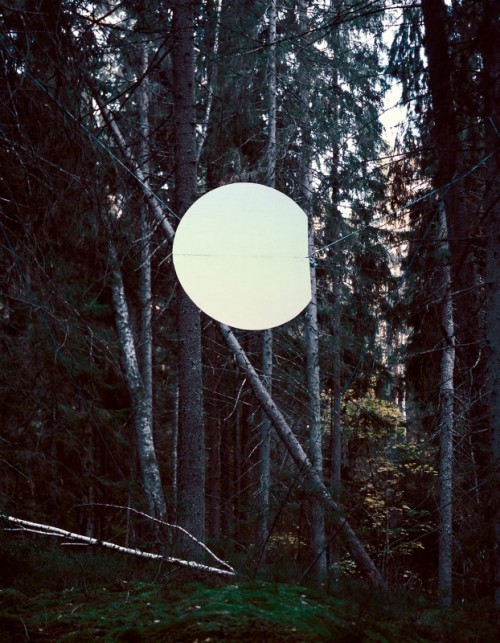AXEL ANTASUncanny Valley 4.2.2017 – 26.2.2017
 Uncanny Valley (Moon), 2016
Uncanny Valley (Moon), 2016C-print
58 x 48 cm
edition 5
AXEL ANTAS
For his solo exhibition, Finnish artist Axel Antas brings together new C-type photographs and
video with pencil drawings to explore our physical relationship to the natural
world, and our alienation from it.
Travelling through the remote forests in the north of Finland, Antas sought out an unfamiliar landscape distanced from his everyday surroundings. Interacting with the trees themselves - silver birch, aspen, spruce - he climbed their trunks, observing how they were affected by his weight. In the Pathetic Fallacy series of
C-type photographs (all 2016), circular concrete masses equivalent to the
artist´s own weight are distributed within and hung from the trees. In one, the
branches arch and droop under this pressure, reaching down for the earth amid a
hazy white fog that consumes the surrounding environment. Another sees golden
leaves shimmering against silvery bark as the concrete globes hang. These
weights animate and anthropomorphise the otherwise still trees; arms, leaves
and branches appear heavy and sad, seemingly burdened by an emotional strain.
Influenced by a reading of The Tears of Things (Melancholy and Physical
Objects) by writer Peter Schwenger, these works speak of how physical
objects can situate and define us, personifying our feelings, whilst also
remaining autonomous and indifferent.
Other photographs such as Binary (2016)
depict smoke rings rising from the landscape. With purple foliage in the
foreground framing an imposing mottled grey rock, the background´s misty canopy
gives rise to the round mass of smoke, which ethereally floats above the
treetops. Reminiscent of the curvature of sun or the moon, it surveys the scene
below, lonely and isolated in a barren white skyline.
At nearly two-and-a-half meters in height, the
exhibition´s large-scale pencil drawings, Forest and Ellipse Obscured and
Forest and Triangle (both 2016), both exceed human proportions. These
delineate the dense foliage of the forest in subtle grey hues. At the central
focal point of both pictures, geometric forms such as circles and triangles
nestle behind intertwined trees and clusters of roots. In converse to the
photographs, these shapes represent voids where weight has been removed,
leaving stark white omissions. Produced through a slow, meditative process of
calmly and systematically applying graphite to paper, the passing of time is
captured in the process of this mark marking, and yet the eye rests on an empty
space, the gaze settling upon this nothingness, this hole.
Circles and the meditative concept of the void
reappear in the video work Lines describing a circle (2016) where Antas has filmed close-ups of his
parent´s hands repeatedly drawing these forms in pencil and ink, often with
less-than-perfect results. Based upon the Zen Buddhist ensō tradition where a
circle is drawn every day, one or two uninhibited brushstrokes expresses a
moment when the mind is enlightened and free to let the body create. The
circles created by Antas´ parents are symbolic in their imperfection and
fragility, poetically expressing the process of our lifecycles, joining
together the beginning and the end with a playful and light tone.
How can we bridge the gap that exists between
our minds and the surrounding world? With the virtual, digital sphere
increasingly mediating our lives, we can seem progressively separated from both
our own physicality and the tangible, natural realm. Antas seeks to highlight
this gap and the resultant alienation that it propagates. By directly affecting
the landscape - either through active physical interventions or by removing
matter in his drawings - he creates symbolic representations of the body within
the environment, rooting us within it and forging a reconnection.
Louisa Ederton
The multidisciplinary artist Axel Antas (b. 1976, Finland) lives and works in Finland. He studied at The Nordic School of Art, Kokkola, Finland (1997), before taking a B.A., at Goldsmiths College, London, UK (2000). Most-recently he completed the Villa Snäcksund Residency Program, Pro Artibus, Ekenäs, Finland (2016). His works have been showcased in many solo and group exhibitions since 2000 and many of his works are featured in significant public and private collections home and abroad.
